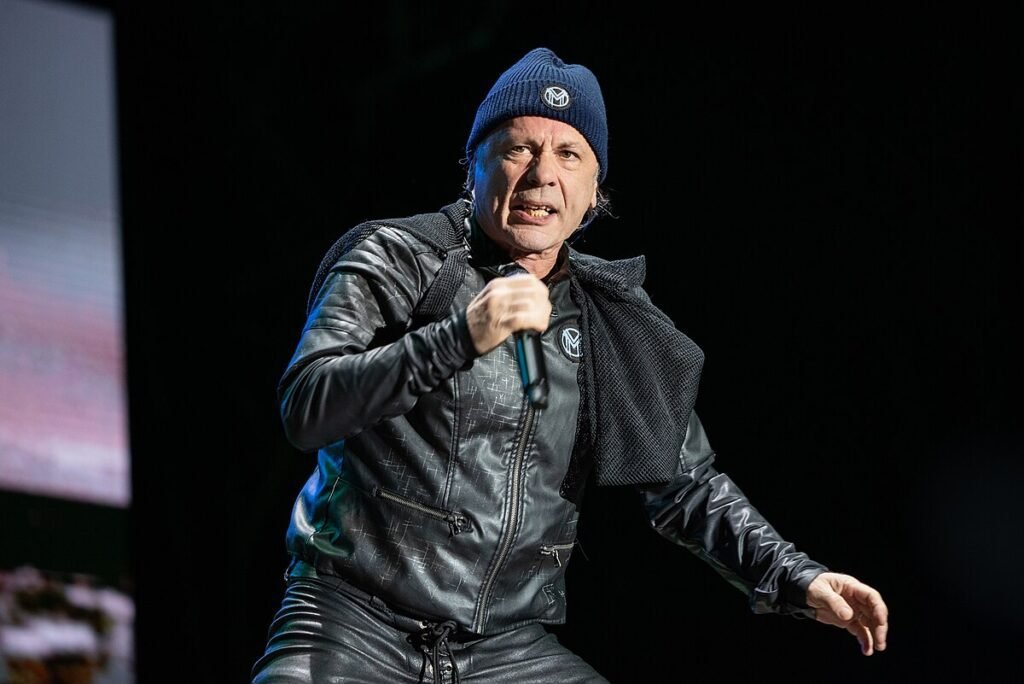In a world where live music is growing increasingly polished by technology, it seems that Iron Maiden’s Bruce Dickinson has drawn a pretty definitive line in the sand. The iconic frontman makes it plain and simple that his band will never depend on backing tracks or other artificial enhancements when it comes to their shows. For Dickinson and his band, authenticity is non-negotiable.
In a recent interview with Classic Rock magazine, Dickinson passionately defended Iron Maiden’s commitment to delivering raw, unfiltered live shows. “The idea that you can turn it into the Disneyland Maiden by using backing tracks, a few tricks… No!” he exclaimed. “Maiden has to be one hundred per cent real — and fucking fierce!”

At 66, Dickinson doesn’t appear to lose steam or any conviction for what the band wants to achieve. He recalls how a fan gushed to him about Maiden: “Still going after all this time.” He responded unequivocally: “Yeah, and we’re doing it for real. There’s no detuning.” When this fan then confessed that so many bands these days use backing tracks, Dickinson got quite frank and said, “No! No, no! [If we use backing tracks,] that’s the day I quit. Or the day we stop. If it’s not real, it’s not Maiden.”
This isn’t the first time Dickinson has voiced his disdain for artificial enhancements in live performances. Last fall, he reiterated that point in an appearance on the Rich Roll podcast. During that interview: “We still play all the songs in the original key. We don’t detune.”. We don’t do anything like that on any of the songs,” he said. When the subject of backing tracks came up, Dickinson was insistent: “Okay, stop right there. No. We’re not gonna do that because it’s not authentic. It’s not real.
He then explained how by relying on such technology, the taste of Iron Maiden’s performances would be lost. “You start to get into the world of Disney World now. So, no. If I can’t do it the way I should be doing it, I shouldn’t be doing it at all.”
Dickinson’s commitment to authenticity extends to every aspect of the band’s live shows. In an October 2023 interview with Australia’s Triple M radio station, he emphasized that Iron Maiden still performs all their songs in their original keys and without click tracks or time codes. “We still play everything too fast, because we’re all excited,” he joked.
He also mentioned his amazement about the normalcy of bands featuring pre-recorded vocals and other dubbed things. “I see a lot of bands now, and I’m going, ‘Hang on a minute. Hey, you sang that without moving your lips.’ So there’s all this backing vocals being flown in left, right and center and everything. But we don’t do any of that. Everything is analog and real.”
For Dickinson, that old-school way is something that she takes a lot of pride in. “I think that pays dividends ’cause the audience understand that reality is increasingly kind of rare now.
Over the past decade, the music industry has been filled with the sounds of pre-recorded tracks, drum triggers, and other technological aids. Although these can ensure that the performances are always more consistent, they risk losing the raw energy and spontaneity that makes live music. Even in rock, a genre that was founded on rebellion and authenticity, many artists have turned to these conveniences.
Iron Maiden, though, is a rare exception. Guitarist Adrian Smith said much the same as Dickinson in a 2019 interview with the New York Post. “I don’t agree with using tapes … I think it’s a real shame,” Smith said. He is worried about how technology has begun to dominate among the newer bands. “The music is getting too technical now. You’re supposed to play live; it should be live.”
Still, not once did they stray from seeking authenticity while muscling through considerable changes. In December 2024, Iron Maiden drummer Nicko McBrain announced his retirement after the band’s final show of “The Future Past” world tour in São Paulo, Brazil. McBrain, whose real name is Michael Henry McBrain, had been a cornerstone of the band’s sound for decades.
Stepping away from touring, McBrain assured fans he would remain involved with Iron Maiden in other capacities, including various projects and personal ventures. The band wasted no time in announcing his replacement: Simon Dawson, a seasoned session drummer and longtime collaborator of Maiden bassist Steve Harris in British Lion.
As Iron Maiden prepares to hit the road again in 2025 for their “Run For Your Lives” world tour, fans can rest assured that the band’s commitment to authenticity remains unwavering. For Dickinson and his bandmates, the magic of a Maiden show lies in its imperfections, its raw energy, and its unshakable connection to the audience.
In an age where technology blurs the lines between reality and illusion, Iron Maiden stands as a beacon of authenticity. As Dickinson so aptly put it, “If it’s not real, it’s not Maiden.” And for millions of fans around the world, that’s exactly why Maiden will always be Maiden.








